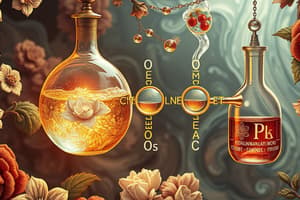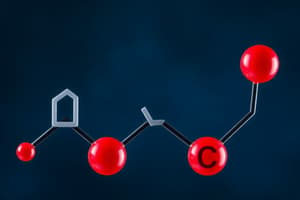Podcast
Questions and Answers
Why are hydration reactions fundamental to chemistry?
Why are hydration reactions fundamental to chemistry?
- They are used for energy storage.
- They involve only organic compounds.
- They demonstrate the role of metals in chemical bonding.
- They showcase the versatility of water in chemical reactions. (correct)
What do hydration reactions provide a clear illustration of?
What do hydration reactions provide a clear illustration of?
- The role of light in chemical synthesis.
- The application of physics in chemistry.
- The behavior of gases in reactions.
- The role of water in chemical reactions. (correct)
How do hydration reactions contribute to scientific discovery?
How do hydration reactions contribute to scientific discovery?
- By showcasing the versatility of water. (correct)
- By providing a method for energy production.
- By demonstrating principles unrelated to chemistry.
- By creating new elements.
What makes hydration reactions an essential building block for understanding chemistry?
What makes hydration reactions an essential building block for understanding chemistry?
What is the primary purpose of hydration reactions?
What is the primary purpose of hydration reactions?
In the general formula for hydration reactions, what does 'n' represent?
In the general formula for hydration reactions, what does 'n' represent?
How are hydration reactions useful in qualitative analysis?
How are hydration reactions useful in qualitative analysis?
Which process involves the formation of coordination compounds through hydration reactions?
Which process involves the formation of coordination compounds through hydration reactions?
Study Notes
Unlocking the World of Hydration Reactions: A Primer
Hydration reactions, a staple in the world of chemistry, are fundamental processes where a water molecule combines with a substance, typically a metal or a nonmetal, to form a new compound. These reactions are often used to synthesize various substances and demonstrate the diverse roles water plays in chemistry.
The Nuts and Bolts of Hydration Reactions
Hydration reactions typically follow the general formula:
[M (s) + H_2O (l) \rightarrow M (H_2O)_n (s)]
In this equation, (M) is the metal or nonmetal that reacts with water, and (n) is the number of water molecules formed during the reaction, which results in the formation of a hydrated compound, (M (H_2O)_n).
Important Applications of Hydration Reactions
-
Synthesis of inorganic compounds: Hydration reactions are used to form hydrated metal ions, which are essential building blocks for many inorganic materials.
-
Preparation of coordination compounds: Hydration reactions are also used to form coordination compounds, where metal ions are surrounded by water molecules or other ligands.
-
Qualitative analysis: Since hydration reactions follow specific patterns, they are used for qualitative analysis to help identify the presence of certain elements or compounds in a mixture.
-
Demonstration of chemical principles: Hydration reactions are often used in chemistry classes to demonstrate concepts, such as chemical bonds, stoichiometry, and the role of water in chemical reactions.
Why Hydration Reactions Matter
Hydration reactions are fundamental to chemistry because they:
- Showcase the versatility of water in chemical reactions.
- Provide a clear illustration of basic chemical principles, such as the formation of chemical bonds and stoichiometry.
- Offer a method for synthesizing important inorganic compounds and coordination compounds.
- Show how chemistry plays a role in everyday life and scientific discovery.
In Summary
Hydration reactions, where a substance reacts with water, are a fundamental concept in chemistry. They provide a clear illustration of the role of water in chemical reactions, offer a method for synthesizing important compounds, and are a tool for qualitative analysis. Hydration reactions are an essential building block for understanding the fundamental principles of chemistry and provide a versatile tool for chemical synthesis and analysis.
Studying That Suits You
Use AI to generate personalized quizzes and flashcards to suit your learning preferences.
Description
Explore the world of hydration reactions in chemistry, where water combines with substances to form new compounds. Learn about the applications, synthesis of inorganic compounds, preparation of coordination compounds, and the role of hydration reactions in demonstrating chemical principles.




